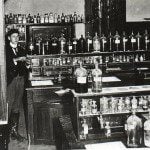
(Wikimedia Commons public domain)
Continuing with the question of whether Joseph Smith was sincere or cynically deceptive, a few notes from my files:
The spirit of Joseph’s private letters is much the same. Detained at an inn in Greenville, Indiana, in June 1832, while his traveling companion, Newel Whitney, recovered from a badly broken leg, depressed at news that his brother Hyrum had lost a child and also by the fact that he had received no recent letter from his wife, the Prophet wrote a note to Emma in which, among other things, he remarked that
My Situation is a very unpleasent one although I will endeaver to be Contented the Lord assisting me I have visited a grove which is Just back of the town almost every day where I can be Secluded from the eyes of any mortal and there give vent to all the feelings of my heart in meaditation and prayr I have Called to mind all the past moments of my life and am left to morn and Shed tears of sorrow for my folly in Sufering the adversary of my Soul to have so much power over me as he has had in times past but God is merciful and has forgiven my Sins and I rejoice that he Sendeth forth the Comferter unto as many as believe and humbleeth themselves before him . . . I will try to be contented with my lot knowing that God is my friend in him I shall find comfort I have given my life into his hands I am prepared to go at his Call I desire to be with Christ I Count not my life dear to me only to do his will. [1]
On 27 November 1832, the Prophet wrote from Kirtland to his friend William W. Phelps, who was editing the Church newspaper in Jackson County, Missouri. Contained in that letter is the following passage, impassioned with yearning and impatient at the constraints of fallen mortality:
Oh Lord when will the time come when Brother William thy Servent and myself behold the day that we may stand together and gase upon Eternal wisdom engraven upon the hevens while the magesty of our God holdeth up the dark curtain until we may read the round of Eternity to the fullness and satisfaction of our immortal souls Oh Lord God deliver us in thy due time from the little narrow prison almost as it were totel darkness of paper pen and ink and a crooked broken scattered and imperfect language. [2]
Incarcerated by the Missouri militia at Independence on 4 November 1838, having escaped execution a few days earlier only because General Alexander Doniphan had refused to carry out the order, Joseph wrote to his wife Emma. The letter concludes with a thoughts of his children and a heartfelt plea to Emma:
Tell them that Father is yet alive, God grant that he may see them again Oh Emma for God sake do not forsake me nor the truth but remember me, if I do not meet you again in this life may God grant that we may meet in heaven, I cannot express my feelings, my heart is full, Farewell Oh my kind and affectionate Emma I am yours forever your Husband and true friend. [3]
[1] In Jessee, Personal Writings of Joseph Smith, 238-239.
[2] In Jessee, Personal Writings of Joseph Smith, 261-262.
[3] In Jessee, Personal Writings of Joseph Smith, 362-363.
Posted from Richmond, Virginia

















